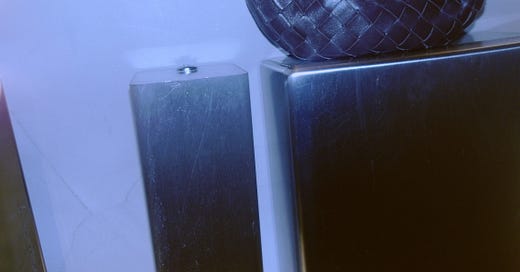“POET: You know, poets back then had it easy?
They could just call on a muse, or a nymph, or a goddess, and
Boom, inspiration.
Boom, answers.
Boom, guidance.
Imagine that today?”
- The Poet, Episode one of The Aphrodite Project
Can you imagined that today? Calling upon a muse or a nymph or a goddess and being gifted, inspired, filled with answers, and guidance, and inspiration?
When was the last time you called on something bigger than yourself for answers? When was the last time you reached out and asked for help from something beyond you, a nudge, a hint from something grander?
But then, what would you call upon?
It’s Monday, and I have a Substack post to write for tomorrow. I open Pinterest where I have a board for writing inspiration, a board for The Aphrodite Project, a board for general vibes, future kitchen, future wedding, future creativity. I scroll through Substack. I read articles. I open Instagram and immediately close it when an ad for weight loss appears.
Where ancient poets would call on Muses to sing of rage and war and heroes, I call on well-curated feeds to inspire my next prose. This raises the question: is the algorithm of our feeds the modern equivalent of the ancients’ divine inspiration? And if so, if inspiration is, like the algorithms, constant, shouldn’t I feel inspired all the time?
When I think of divine invocations, I think of the Iliad. Homer invoked the muses, asking them to sing about Achilles' anger, the hero’s rage. He didn’t ask them to sing about the war, the politics, detailed accounts of a decade-long conflict. Instead, the focus of this epic poem would be emotional, nebulous, and human.
But this emotional specificity wasn’t the rule for invocations. Poets would call on the muses to sing of an entire journey home (Odyssey), a journey away from home (Aeneid), or even about the gods, the cosmos in its entirety (Theogony). Whatever the question, poets asked because they believed creativity came from outside themselves—something inspired, breathed into existence.
The invocations were not just a call for help but part of a creative tradition, a formula for poetry. It was a cultural practice as much as a personal plea for guidance. In addition, it established authority, so maybe it was simply validating what was already there to your listeners, and to yourself a way to step beyond the expectations of what you think you can create.
Today, like a lot of habits and formerly analog rituals, my creative practice seems greatly influenced by algorithms. But something about the scroll, the personalized, curated feeds feel different from the Muses that would speak to the poets. I can’t find the voices of muses or gods in the scroll.
Does this mean that there is no divine inspiration? Have we severed our connection to the supernatural inspiration that our ancestors seemed to have on speed dial? Or is it the opposite, where we now feel like we have constant divine inspiration but it’s really human-made, an attempt at divine inspiration but only a lacking copy, missing that very thing poets used to call muses for?
Where ancient invocations were a surrender to the divine – ‘I offer you my voice, my thoughts in order to communicate the message, the poem’ – today’s replacements rely on a contract: I give you time, attention, you give me prompts, fulfillment, meaning, likes.
It’s instant, fast, familiar. But the challenge isn’t just this instant need for inspiration, this pocket divine intervention we think we can summon at will.
The thing about algorithms as divine inspiration is that while they feel creatively nourishing, they often function as a double-edged sword. You consume things that feel inspiring but in their curation they fail to really challenge you. The posts are comforting, vaguely familiar even if you haven’t seen them before, they echo ideas you already have. They are not the disembodied voices of the deities that the poets called upon, that terrify and excite you, that push you out of your comfort zone, that make you give in to the unknown – an unknown feeling, thought, idea.
I think maybe the real inspiration comes through this surrender.
Personally, my most inspired moments happen after bounds of intense creative hopelessness. When I fully feel and believe that I will never write again, when my imposter syndrome’s usual whisper turns into a droning monologue about how I've never actually written anything worth reading.
My first instinct is, once again, to reach for my phone. Open up Pinterest. The next spark of inspiration is just another personalized pin away, right? Wrong. Instead, I’ve learned, I need to step away from the blank page and just accept it. I will probably cry a little, mourn my short-lived writing career, clean the apartment. I need to fully surrender to this feeling that I am currently unable to write. Maybe this struggle is its own kind of offering. This not knowing, the acknowledgement of not knowing, its own kind of surrender to the divine, whatever that might be.
It’s in these moments, in this surrender, that I suddenly notice pickles and spiders and the ticking of clocks, and in those find the words. Is it rude, blasphemous to see these moments, these small, mundane sounds and beings, as modern divine intervention?
What do you call upon if not the algorithms? I think we call upon ourselves. The mundane. The unstimulating, averageness of the human experience. And in that, in those quiet moments outside of the scroll and dopamine hits, we can find inspiration. Not a big BOOM, not an explosion, but a hunch, a whisper from something bigger than ourselves but somehow also, always, contained deep inside.




